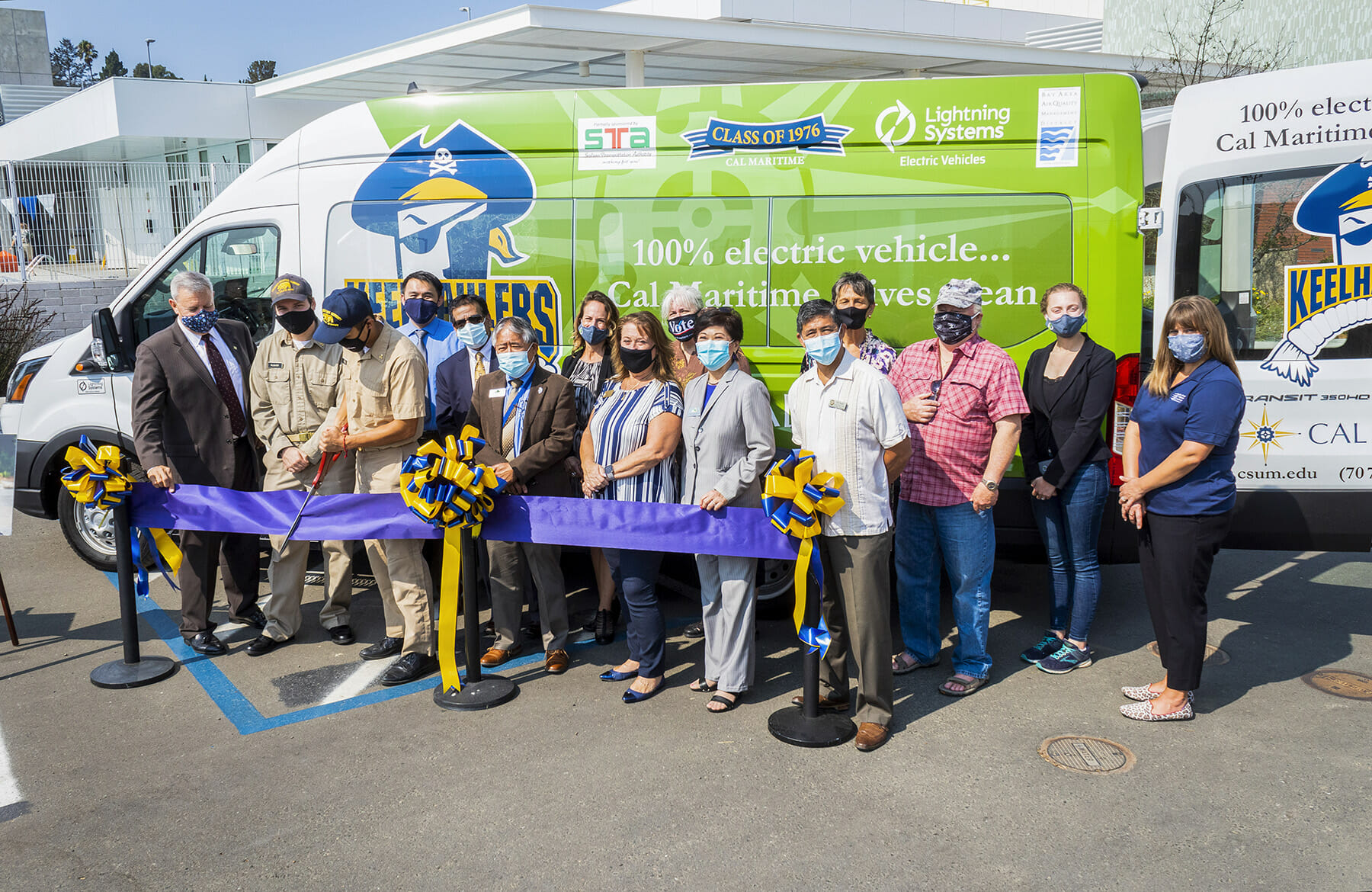Cal Maritime Introduces New Zero Emission ‘Keelhaulers’ Transport Van
Vallejo, Calif., Sept. 21, 2020 – Continuing its ambitious path toward a carbon-free campus by 2029, Cal Maritime today introduced its first all-electric passenger van in a ribbon-cutting event attended by University officials, faculty, students, government representatives, and industry partners. The shuttle will be used on campus for transporting students from residence halls to central campus, for off-campus shopping and student activities, as well as for transportation to local athletic competitions.
The 10-seat zero-emission transit van features 86 kWhs of battery capacity with a range of 102-137 miles. The vehicle can be charged in three hours by a 25 kW DC fast charger located next to the University’s upper residence hall, Maritime North, one of main stops on its route. Fully owned by Cal Maritime, the new van was partially funded by Bay Area Air Quality Management District (BAAQMD), Solano Transportation Authority (STA), and Cal Maritime’s Class of 76. It replaces a previously leased gasoline bus.
“This green, clean vehicle is a welcome addition to Cal Maritime,” said President Tom Cropper, who officiated at the ribbon-cutting event. “Air quality is top of mind for all of us in Solano County and throughout California. Our transition to electric transportation represents sure progress in achieving clean air and reducing our dependency on fossil fuel – while lowering costs at the same time,” he added.

Cal Maritime’s Director of Energy and Sustainability Sheikh Nayeem, who spearheaded the project, underscored both its collaborative nature and academic value.
“This has been a team effort” Nayeem said. “Our industry partners, local officials, faculty, staff, students and alumni all worked together to provide an environmentally friendly solution to our transportation needs. Our new “Keelhauler van” is a visible sign of Cal Maritime’s commitment to sustainability, both in our practices and in our curriculum.”
The project has also served as internship opportunity to students, providing exposure to various aspects of the burgeoning electric vehicle industry, including its economic, environmental, and engineering aspects.
The vehicle, a Ford Transit 350HD, was modified to be fully electric by Lightning Systems, Inc. in Loveland, Colorado. The van was upfitted to meet ADA requirements by NorCal Vans of Chico, California. The charger, also sold by Lightning Systems, was installed by Otto Construction.
More infrastructure for Cal Maritime’s ongoing electrification can be found in the University’s main parking lot, where 30 electric chargers were installed earlier in the summer in partnership with PG&E and STA. The new electric van can also utilize these chargers in between trips around campus.
About Lightning Systems
Lightning Systems provides complete electrification solutions for commercial fleets, including turnkey charging and energy systems–from Class 3 cargo and passenger vans to Class 6 work trucks, Class 7 city buses, and Class 8 motor coaches. The Lightning team works with forward-thinking fleets to provide engineer, develop, and deliver commercial electric vehicles with a full suite of telematics, analytics, and charging solutions to maximize fleet and energy efficiency. To learn more, visit www.lightningsystems.com.
About Cal Maritime
Established in 1929, California State University Maritime Academy is the only degree-granting maritime academy on the West Coast. Located in Vallejo, California, the campus serves approximately 1,200 students and offers undergraduate degrees preparing students for careers in engineering, transportation, international relations, business and global logistics. Cal Maritime also offers a master’s degree in Transportation and Engineering Management, as well as a number of extended learning programs and courses. Beginning in 2020, the University is adding an Oceanography major. Recently, the campus has garnered recognition for its high-achieving graduates – on average, the highest-earning alumni of any public university in California 10 years after graduation. To learn more, visit https://www.csum.edu.